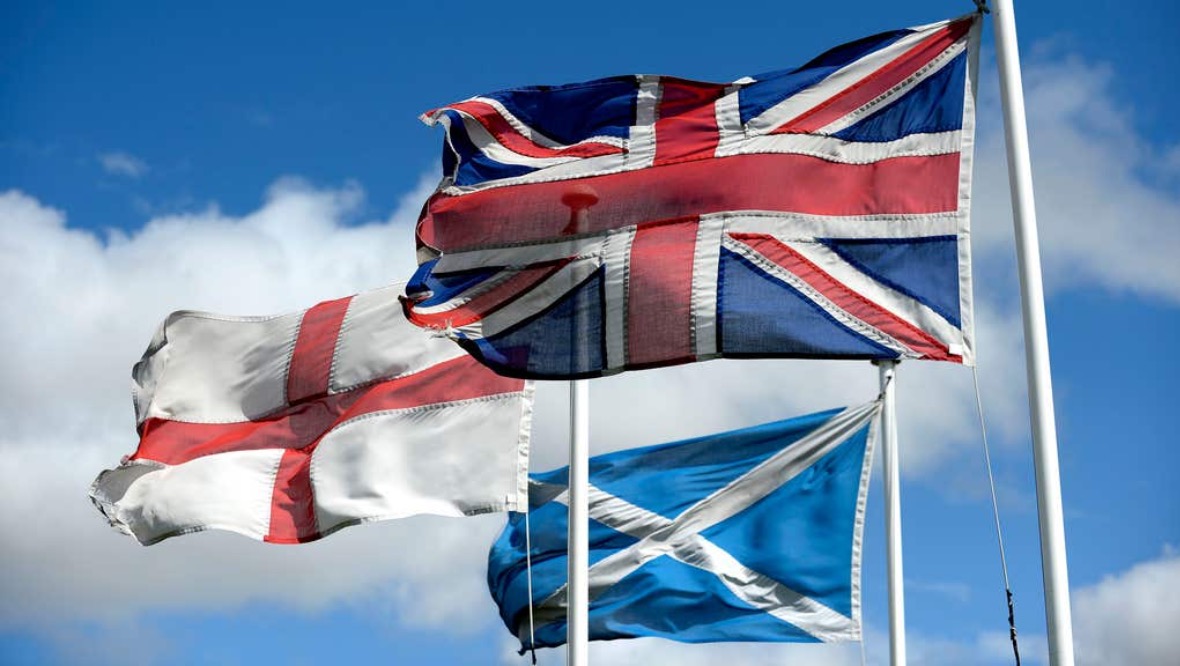Rejecting Nicola Sturgeon’s calls for a second Scottish independence referendum is “plain common sense” and the “responsible thing to do”, a former UK Government minister has insisted.
Lord Dunlop, who served as a Scottish Office minister and was an adviser to David Cameron when he was in Downing Street, spoke out as he made the case for reform of the union between the different nations of the UK.
But rather than being seen as an effort to combat a second vote on Scotland leaving the UK, he said this work should instead “be framed as making the United Kingdom fully match-fit for a post-Brexit and post-Covid world”.
This could be a “watershed moment requiring national renewal for the UK”, Lord Dunlop added.
His comments came in a new paper marking the new initiative by the Policy Exchange think tank, with the Future of the Union project being led by Tory MSP and constitutional law expert Prof Adam Tomkins MSP and Eddie Barnes, who was an adviser to Ruth Davidson when she was Scottish Conservative leader.
The Scottish First Minister has been pressing for a second independence referendum ever since the UK voted to leave the European Union and Scotland voted to stay.
Those calls have been growing, following an increase in support for Scottish independence, with some 20 polls in Scotland now showing a majority in favour of leaving the United Kingdom.
But Lord Dunlop was clear, saying: “For the UK Government to reject a demand to hold any time soon another referendum on Scottish independence is not, as Nicola Sturgeon would have it, ‘a denial of democracy’ – it’s plain common sense and the responsible thing to do.”
With the Covid-19 pandemic continuing, he added: “The idea that government resources should be diverted from the task of recovery to conduct what would inevitably be another costly and divisive referendum will strike many as a profoundly wrong-headed ordering of priorities, with potentially damaging consequences not just for Scotland, but throughout the UK.”
But he was also clear that “simply explaining to people in Scotland why now is not the time for another independence referendum isn’t a sufficient or sustainable long-term strategy for supporters of the union”.
To boost the case for the UK, he said he had recommended Prime Minister Boris Johnson set up a new cooperation fund, which would promote greater joint working between the UK and devolved governments.
Lord Dunlop, who carried out an as-yet unpublished review of devolution commissioned by previous prime minister Theresa May, added while devolution had developed over the last two decades, there had been “little equivalent development” of the arrangements for inter-governmental relations.
Reform in this area is “urgently required as it is part of the essential glue that binds together the United Kingdom”, he said, calling for an enhanced Intergovernmental Council.
Devolution in England is also needed, Lord Dunlop argued, but he insisted that “soundbite solutions like federalism are not the answer”.
The former minister said that “establishing a separate English executive or parliament, far from securing the Union, risks irrevocably destabilising it”.
Instead he suggested establishing an English Regions Forum, saying this could complement reforms to the mechanisms for intergovernmental relations.
He stressed the need for greater cooperation, not just between Westminster and the devolved administrations, but also between central and local government.
Here Lord Dunlop said there should be a “Union of Cooperation”, adding that that could “encompass not just cooperation between the UK Government and devolved nations, but also between central and local government and within local government”.
He stressed: “Working together at a time of crisis should be a no-brainer – that’s a natural human instinct, even if it’s against the deeply ingrained political instincts of SNP leaders.”
As well as calling for a cooperation fund, the Conservative politician said his Dunlop Review had proposed a second fund be established that would “incentivise Whitehall departments to identify and bring forward Union-enhancing projects in reserved areas”.
In response, an SNP spokeswoman insisted: “Trying to defy the results of free and fair elections is very far from being the ‘responsible thing to do’ – it would be a democratic outrage which would not stand, just as it failed for Donald Trump.”
She added: “Lord Dunlop is the man reputed to have asked Margaret Thatcher to foist the poll tax on Scotland before any other part of the UK, so it is perhaps no surprise that he is behind this nonsense.
“It is the Scottish people who will decide upon the future of Scotland – not a Tory government at Westminster led by the likes of Boris Johnson.
“People in Scotland deserve the choice of a better future than the one proposed by this out-of-touch Tory government – so it’s no wonder that 20 consecutive polls have shown that a majority would vote for independence.
“The question is who the people of Scotland want to be in charge of rebuilding our country after this Covid-19 crisis – a Scottish Government or a Westminster one, led by the likes of Boris Johnson? The SNP is determined to give the people of Scotland that choice in a post-pandemic referendum.”
Follow STV News on WhatsApp
Scan the QR code on your mobile device for all the latest news from around the country


 PA Ready
PA Ready

























